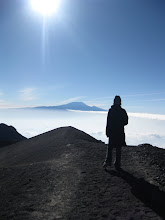Day 8--Siku Nane

On the way back through the village near the falls, I asked a little boy if I could take his picture. I said "cheza" intending to say smile, but smile is acutally "cheka" and cheza is dance. So he did this little shy boogie-twist move and it was absolutely the cutest thing I've ever seen. So I can't
say I regret that swahili mistake.

On the bus ride back to Arusha, we saw Kilimanjaro for the first time. The whole back of the bus (us tourists) screamed an excited "OH!" at the first sight of it, even though it was mostly obstructed by trees. Everyone in front probably thought "what? what happened?" Until they realized we were new tourists as we proceeded to take a million photos of it as we drove by. I watched throught the window the whole ride back. Africa is so beautiful in the hours before sunset.
Day 9--Siku Tisa
Today I taught a class of about 15 children around 7 years old. I absolutely loved it. The kids were hard to control. Even with Christian helping me, less than half the kids copied everything I wrote. (Granted not all of them had paper or pencils). I only made it through the upper and lowercase alphabet and the numbers one through 20. They also love my mini dry erase board (good idea mom). I taught them a camp Ohieyesa song today too and they loved it.
The most exciting part of the day for me though was that Gift, the little boy who sleeps outside and has the mark under his eye, was at school today. And he smiled back at me. He was wearing different clothes and I had to look twice to make sure it was really him. It made me so happy to see him singing and dancing the hokey pokey with all the other children. Jessica bought him a mattress and a blanket that she and the staff will take to him this week. I realize that the orphanage is nothing compared to a real school, but I can't help being so grateful that we can give them a few hours of fun and love each day.
Day 10--Siku Kumi
Not gonna lie, I could really go for a hot shower and some pizza right now. I did buy a mango for less than 60 cents american today though.
We took the kids to the lake today. We fit 70 people in a dalla dalla today. That's right. Seventy. A dalla dalla, by the way, is a van that is intended for about 16 people. The dalla dalla is the most common type of transportation here. It's not uncommon to climb on a dalla dalla to get a ride home and find chicken at your feet. My friend said there were 27 adults on the dalla dalla on her way to the market last Wednesday. Granted most of the 70 people were small children. But still. It was the most ridiculous thing ever. There were two people riding outside hanging on the back too.
Well I'm done writing for now, because it's time for our host families favorite dubbed soap opera. I have to know what's going to happen to the crazy jealous sick woman and the her husbands love affair with Aymar the island girl. Kwa heri.
Day 12--Siku Kumi na mbili
Today there was a new arrival at Faraja orphanage. She is about 12 years old and speaks only Maasai (no english or swahili). She was forced to marry an old man but ran away from her husband and somehow ended up with police and then here. She seemed quite happy to be at Faraja and I can't wait to get to know her better, she seems so sweet. I hope we can make her feel at home and that Faraja can find a place for her to stay.
Day 12--Siku Kumi na mbili
Today there was a new arrival at Faraja orphanage. She is about 12 years old and speaks only Maasai (no english or swahili). She was forced to marry an old man but ran away from her husband and somehow ended up with police and then here. She seemed quite happy to be at Faraja and I can't wait to get to know her better, she seems so sweet. I hope we can make her feel at home and that Faraja can find a place for her to stay.
(Moiva is the girl in the Detroit shirt, this picture was taken on her first day)
I'm really excited about all the ideas the volunteers have and about all we hope to accomplish.
That's it for now. Write more later. (after Safari!)
That's it for now. Write more later. (after Safari!)





